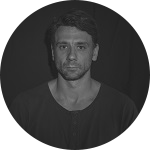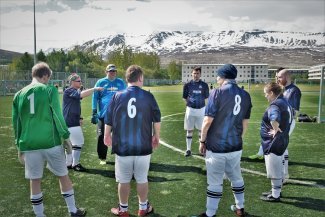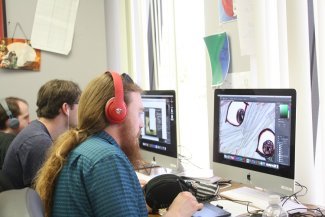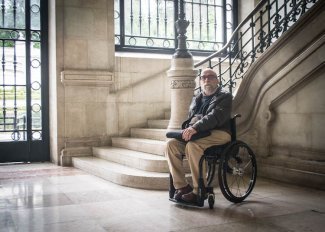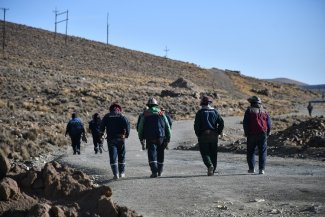“For me, football is the ultimate freedom,” says José Luis Giera. Also known as Pepelu, Giera is a striker for the Alicante team and Spain’s Blind Football Players squad. He became blind at the age of one and a half. “I cannot see the pitch but I have a mental image of what it is, and given the sense of direction that I have as a blind person, together with the help of the guides, I am able to think about the move I want to make and how I want to play,” he explains.
“When I listen to a football game and I hear that a player has aimed for the far post, nobody needs to explain that to me because I do it every weekend,” says José López, who has been blind since birth. López, a secondary school teacher at the Reus state school in Tarragona, Spain, is one of the most experienced players in the league. He plays for Tarragon and has been the top goal scorer in the championship six times.
No, they can’t see the ball or the goal, but they are capable of scoring goals just as spectacular as those scored by soccer stars. The National Blind Footballers League players perform at such a high level you forget they are blind.
Despite having won several Olympic medals, having been seven times champions of Europe, plus several times runners-up in the European championship and the world championship, they are not paid for playing. For them, football is not a business, nor does it require recognition.
For a blind person, relying on a guide dog or a walking stick is part of normal life: “football gives me the independence that I don’t have throughout the day,” says Adolfo Costa, the captain of Madrid and an international player for Spain. And football is the only team contact sport, with full freedom of action, for blind people.
Their ears are their eyes

Javi Muñoz, a Barcelona B1 player, in the dressing room getting ready to go out on the pitch.
The first palpable difference about a football game played by blind people is the absolute silence in the ground. For the footballers to be able to hear the sound of the ball – which has a rattle inside – and the instructions from the guides, as well as their team mates and opponents, it is forbidden to cheer them on or raise one’s voice from the stands.

Members of the Alicante B1 team, during half time.
In reply to the usual question about the use of blindfolds they say that not only do they have to wear them but also there are regulation patches that the referees check before every game. The reason for this is to ensure that everyone competes under equal conditions, since although all the category B1 players have lost their sight completely, some have residual vision that enables them to identify light and dark.

Adolfo Costa, Fito, a Madrid B1 player, challenging José Luis Giera, Pepelu, an Alicante B1 player, for the ball.
“If you don’t say ‘voy’ (I’m going) it’s a foul,” they explain. Players often collide. To avoid this, a defender who goes to cut off the ball must warn their opponent by continually saying “voy” so that the attacking player, located by the sound of the ball, knows where the defender is and can avoid a collision. To fail to say “voy” is a foul, and if anyone repeats the offence they get a yellow card.

Shooting for the goal during a set piece routine.
“People have always doubted our goal scoring. The truth is that with blind people’s football, even after so many years, people still make jokes. They say ‘If you play in a team of blind people, you don’t score any goals do you?’ And if you reply, ‘Well, yesterday, I scored four,’ they don’t believe you.” Antonio Cesar Leal, goalkeeper and guide for the Tarragona team, with more than ten years’ experience, adds: “Before they come to see a game, people think it’s about four blind people running after a ball, and nothing more. Afterwards, they see the high level of the game they play, the carefully worked out tactics, the intensity of the competition, and they can’t understand how they are capable of doing it.”

Álvaro, an Alicante B1 player, defending.
The goalkeepers have a fundamental role; as the only seeing members of the team, when they are not on the pitch trying to save goals, they are guiding the attack by their respective teams so that they can score.
“They put you behind the goal that your team is attacking. The essential thing for them is your voice, so that they know exactly where the goal is all the time. Every player is an individual and has their own way of signalling. We try to ensure that most of the signals are general for the whole team, but ultimately every player has their own,” explains Antonio Cesar, who enjoys both playing in goal and being a guide equally, and recognises the importance of both roles.

Antonio Martín Gaitán, el Niño, leads the warm-up for his team, Tarragona B1.
The guides are used to giving as much information as possible with as few words as possible, from the distance to the goal, to the number of opponents or where their team mates are.

Javi Muñoz, a Barcelona B1 player, is given first aid after colliding with a player from the opposing team and getting hit on the nose.
Pedro Gutiérrez, a goalkeeper for Madrid and the Spanish squad, recalls his first time at the club: “From the first day, I stopped playing with my friends in the university team...When you see them play for the first time you think: “This just can’t be... and then you are hooked.” But he also talks about the temptation to imitate them: “I am already used to seeing them play, they make it look so easy. You take it for granted that they can control the ball, dribble, pass from one to another, make a heel pass. But when you try to do it yourself, you are lost... It’s putting on the blindfold, the light goes out and you can’t do anything.”

Vicente Aguilar, Chapi, from Madrid B1 and Álvaro, from Alicante B1, embrace at the end of the match.
These blind players have their feet on the ground, despite having lived and competed like very few sports people.

Pepelu, from Alicante B1, smiles as he lies on the grass after the final whistle.
“For a sighted person, from the outside, it might look astonishing, but for me getting the ball, dribbling the ball, scoring goals, is something I find natural,” says Antonio Martín – known as el Niño because he began playing at an early age. Martín has been repeatedly named best player in Europe and currently plays for Malaga. His sighted friends are often his biggest fans and when he is asked what would happen if one of the players recovered their sight, Antonio Cesar has no doubts: “If one of the top players in our league, such as el Niño, were to be put on a pitch with the top, sighted footballers...he might not be my friend any more. He’d be driving around in a Ferrari!” he laughs, then adds “He’s a born goal scorer, he’d win the Pichichi trophy every year, he’d beat [Lionel] Messi or Cristiano [Ronaldo]; the top teams would be fighting over him.”



